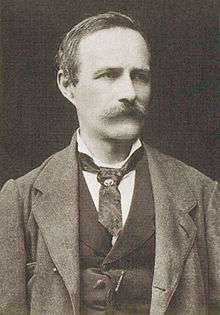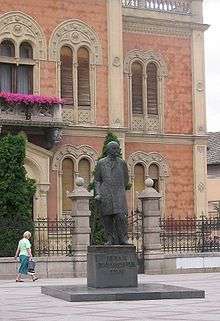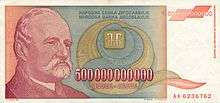Jovan Jovanović Zmaj
| Jovan Jovanović Zmaj Јован Јовановић Змај | |
|---|---|
 | |
| Born |
Jovan Jovanović 24 November 1833 Novi Sad, Austrian Empire (today Serbia) |
| Died |
1 June 1904 (aged 70) Sremska Kamenica, Austria-Hungary (today part of Novi Sad, Serbia) |
| Pen name | Zmaj |
| Nationality | Serbian |
| Notable works | Đulići, Đulići uveoci, Pevanija, Druga pevanija |
| Spouse | Ruža Ličanin |
|
| |
| Signature |
 |
| Wikisource has original works written by or about: Jovan Jovanović Zmaj |
Jovan "Jova" Jovanović (Serbian Cyrillic: Јован Јовановић Змај, pronounced [jɔ̌v̞an jɔv̞ǎːnɔv̞it͡ɕ zmâj]; 24 November 1833 – 1 June 1904), also known as Jovan Jovanović Zmaj or Zmaj, was one of the best-known Serbian poets. He was a physician by profession.
He wrote in many of the genres of poetry, including love, lyric, patriotic, political, youth's, etc. But he is best known for his children's poetry. His nursery rhymes have entered the Serbian national consciousness and people sing them to their children without necessarily knowing who wrote them. He also translated the works of some of the great poets, Russia's Lermontov and Pushkin; Germany's Goethe and Heine; and the United States' Longfellow.
His nickname Zmaj (Змај, meaning "dragon") derives from May Assembly (3 May 1848), in Serbian Cyrillic: 3.мај. The dot ( indicating an ordinary number in Serbian ) was mistakenly left out, thus the writing read "3мај".
Biography
Zmaj was born in Novi Sad, then a city in Batsch-Bodrog County (Kingdom of Hungary, Austrian Empire; today in Serbia), on 24 November 1833. He finished elementary school in the town, and secondary school in Preßburg (today Bratislava), later studying in Ofenpesth (Budapest), Prague and Vienna. In 1870, he returned to Novi Sad to work as a doctor, motivated by the fact that his wife and children were suffering from tuberculosis.
His family was an old and noble family. In his earliest childhood he showed a great desire to learn by heart the Serbian national songs which were recited to him, and even as a child he began to compose poems. His father, who was a highly cultivated and wealthy man, gave him his first education in his native city. After this he went to Ofenpesth, Prague, and Vienna, and in these cities he finished his studies in law. This was the wish of his father, but his own inclinations prompted him to take up the study of medicine. He then returned to his native city, where a prominent official position was offered him, which he accepted; but so strong were his poetical instincts that a year later he abandoned the post to devote himself entirely to literary work.
His literary career began in 1849, his first poem being printed in 1852, in a journal called Srbski Letopis ("Serbian Annual Review"); to this and to other journals, notably Neven and Sedmica, he contributed his early productions. From that period until 1870, besides his original poems, he made many translations to Serbian from Hungarian of works by Sándor Petőfi and János Arany, two of the greatest Hungarian poets, from Russian of the works of Lermontov, as well as from German of several German and Austrian poets. In 1861 he edited the comic journal, Komarac (The Mosquito), with Đorđe Rajković. That same year he started the literary journal, Javor, and to these papers he contributed many poems.
In 1861, he married, and during the happy years that followed he produced his admirable series of lyrical poems called Đulići, which probably remain his masterpiece. In 1862, greatly to his regret, he discontinued his beloved journal, Javor, a sacrifice which was asked of him by Svetozar Miletić, who was then active on a political journal, in order to insure the success of the latter. Politically engaged, he sympathized with the ideas of the United Serbian Youth, a movement which attracted a number of influential figures in Serbian public life in the period of the 1860s to 1870s. These include the politicians and writers Jevrem Grujić (1826–1895), Jovan Ilić (1823–1901), Svetozar Marković, Sava Grujić, the historians Stojan Novaković, Milovan Janković (1828–1899), Vasa Pelagić (1833–1899), and the political writer Vladimir Jovanović.
In 1863, he was elected director of the Tekelianum, at Ofenpesth (Budapest). He now renewed the study of medicine at the university, and took the degree of doctor of medicine. Meanwhile he did not relax his literary labors. He also devoted himself greatly to education of Serbian youth. During his stay in Ofenpesth he founded the literary society, Preodnica, of which he was president, and to which he devoted a large portion of his energies. In 1864 he started his famous satirical journal, "Zmaj" ("The Dragon"), which was so popular that the name became a part of his own. In 1866, his comic play "Šaran" was given with great success.
Since 1870, Zmaj has pursued his profession as a physician. He was an earnest advocate of cremation, and has devoted much time to the furtherance of that cause.
The end of the poet's long life was saddened by domestic sorrows. The loss of his wife in 1872 was followed by another great pain of losing the only child who outlived her mother, out of his five children. How much these misfortunes affected him is plainly perceptible from the deeply sad tone of the poems which immediately followed. In 1873 he started another comic journal, the Žiža. During the year 1877 he began an illustrated chronicle of the Russo-Turkish War, and in 1878 appeared his popular comic journal, Starmali. During all this period he wrote not only poems, but much prose, including short novels, often under an assumed name.
Zmaj died on 1 June 1904. His remains, after lying in state followed to the ceremony of Sremska Kamenica by a vast cortège, including the royal princes and all the great officers of the state.
Politics

At the very outset of Zmaj's political career he learned to listen to the recital of his failings. The great Slav scholar Vatroslav Jagić wrote in 1866 that it was a great pity that so gifted a poet should be preoccupied with humour, for otherwise literature would have benefited more greatly. Later on Laza Kostić, a friend of the poet, and a well-known propagator of Shakespeare among the Serbs, regretted that in this case, as in the second poem of the Iliad, the "dragon" (Zmaj) had swallowed the bird: the politician had swallowed the lyric poet.
In retrospect, someone should speak as a historian, asking not what would have become of Zmaj under different circumstances, but how he fulfilled the mission entrusted to him by Svetozar Miletić and what he did where he was placed, as by Plato's Socrates.
When Svetozar Miletić was imprisoned, then fell ill, and was no longer the national leader, there remained, however, the poet (Zmaj) who had learned to write poems on the dreams and desires of a people resigned to its fate. Zmaj remained alone, and he tried both to save the program and the party that was breaking up, and to bring about harmony between the semi-socialistic new generation and the old liberalism. When this proved impossible, Zmaj became estranged from his former friends and followed the current, in the belief that he would thus better serve the freedom he had loved from his childhood. He died on 1 June 1904 in Sremska Kamenica (in modern-day Serbia). He was then a member of the governing body of the Radical party in the Vojvodina.
Literary Work
Of the same bent as Đura Jakšić and Laza Kostić is Jovan Jovanović Zmaj, also known as the poet of sympathy. In his lyric songs under the collective titles Đulići (Little Rosebuds) and Đulići Uveoci (Faded Little Rosebuds), he touches the highest point of his creative genius. There are six large volumes of his Pevanija (The Book of Songs), and several smaller collections including the satires, epigrams, and children's songs. To the American literary world Zmaj is known partly through the renderings of Robert Underwood Johnson, editor and publisher of New York City's Century Magazine and a good friend of Nikola Tesla. In the following we have the poet's definition of poetry that few would think of contending for even in these days:
Where is Pain and dire Distress,
Songs shall soothe like soft caress;
Though the stoutest courage fails,
Song's an anchor in all gales;
When all others fail to reach,
Song shall be the thrilling speech;
Love and friends and comfort fled,
Song shall linger by your bed;
And when Doubt shall question, Why?
Song shall lift you to the sky.
Perhaps best known for his poetry for children, Zmaj was also one of the first authors of comic strips in Serbia.[1]
Legacy


The Zmaj Children Games (Змајеве дечје игре/Zmajeve dečje igre), one of the biggest festivals for children in Serbia and the Novi Sad region, are named after Jovan Jovanović Zmaj. The town of Sremska Kamenica bore the name Zmajeva Kamenica (Zmaj's Kamenica), in his honour. He is included in The 100 most prominent Serbs.
Works
Collections of poems
- Đulici
- Đulici uveoci
- Pevanija
- Druga pevanija
- Snohvatice I-II
- Devesilje
- Istočni biser
- Pesme Mirca Shafije
- Čika Jova srpskoj omladini
Prose
- Šaran
- Vidosava Branković
Selected translations
- Vitez Jovan
- Herman i Doroteja
- Ifigenija u Tavridi
- Pesme Mirca Shafije
- Enoh Arden
- Demon
References
- ↑ [Projekat Rastko] Zdravko Zupan i Slavko Draginčić: Istorija jugoslovenskog stripa I. Rastko.rs; retrieved 31 July 2014.
- This article incorporates text from the Zmai Iovan Iovanovich – the Chief Servian Poet of To-Day by Nikola Tesla, a publication now in the public domain.
- Jovan Skerlić, Istorija Nove Srpske Književnosti (Belgrade, 1921), pages 298–309.
- Божидар Ковачек. "Јован Јовановић Змај (1833–1904)". Projekat Rastko.
External links
| Wikimedia Commons has media related to Jovan Jovanović Zmaj. |
- Translated works by Jovan Jovanović Zmaj
- Jovan Jovanović Zmaj – Biography (in Serbian)
- Jovan Jovanovic Zmaj (portrait; two children's poems in English, more poems in Serbian)
- Jovan Jovanović Zmaj: Zmajeve Dečije Pesme (Poems for children in Serbian)
- Jovan Jovanović Zmaj: Dečje Pesme (Children's poems in Serbian)
- Jovan Jovanović Zmaj in South Slavic Literature Library (poems of various genres in Serbian)
- Šaran (in Serbian)
- Jovan Jovanović Zmaj publications in the National Library of Serbia